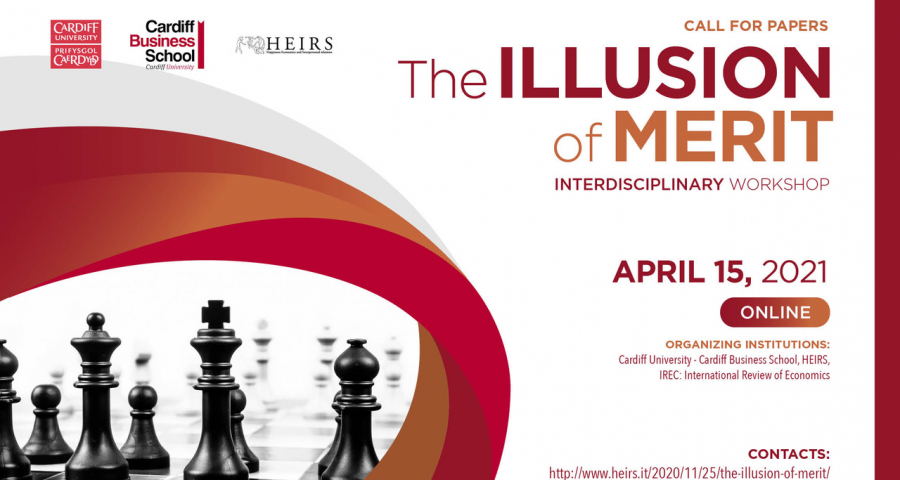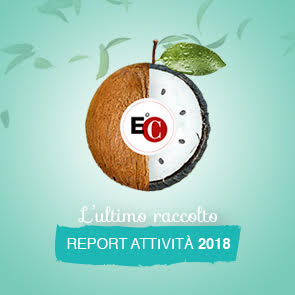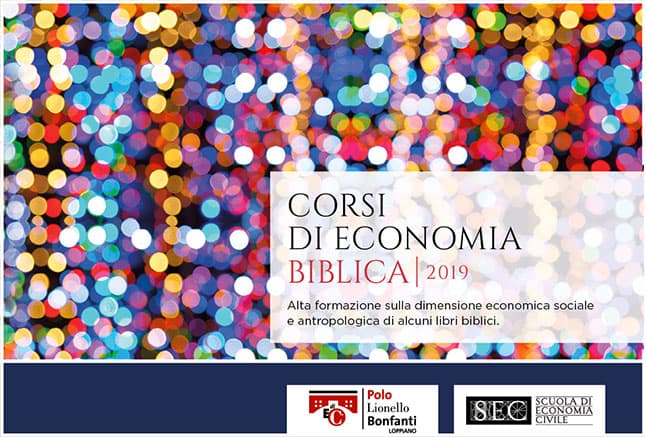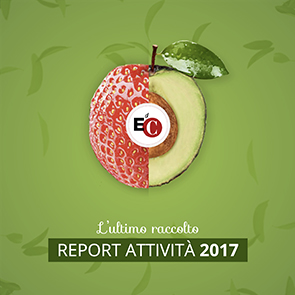Cardiff University, Cardiff Business School and HEIRS association, organize the Interdisciplinary workshop:
“The Illusion of Merit”
Online event, April 15, 2021
Keynotes by: Robert Frank (Cornell) | Jo Littler (City, UoL) | Daniel Markovits (Yale) | Robert Sugden (UEA) |
Manifesto: Nowadays, Western societies revolve around the concept of meritocracy. This umbrella term is gaining more and more momentum in different social spheres. In Politics, Education, Public Health, those deemed as ‘deserving’ are encouraged through incentives and receive better positions and treatments. Other logics, as gratuitousness, equality of opportunity, are progressively losing ground but they remain fundamental to understand why in many states persist universal scholarly duties, public access to health treatments, and so on.
While meritocracy finds support in public opinion (Bell 1972, 2012; Herrnstein and Murray 1994), from the pioneering work of Michael Young – The Rise of Meritocracy (1958) – there has been a rising current of criticism in the 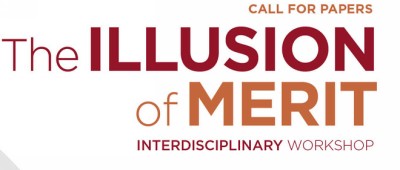 academic domain (Vlastos 1975; Chapman 1986; Hayes 2013; Bloodworth 2016; Appiah 2018; Scaggs 2018; Markovits 2019; Sandel 2020). Critiques of meritocracy converge on one point: the meritocratic discourse legitimates socio-economic inequalities and contrasts redistribution (Arrow, Bowles, and Durlauf 2000; Alesina and Angeletos 2005; Charité et al. 2015; Frank 2016; Heiserman and Simpson 2017; Laird 2017; Weinzierl 2017; Sugden 2018 Alesina et al. 2018; Piketty 2019). In Piketty’s words, “the discourse of meritocracy and entrepreneurship often seems to serve primarily as a way for the winners in today’s economy to justify any level of inequality whatsoever while peremptorily blaming the losers for lacking talent, virtue and diligence” (Piketty 2020, 2). As the other side of the coin, people who are affected by the socioeconomic inequalities produced by meritocracies see these inequalities as necessary and legitimate (Jost et al. 2003; Bénabou and Tirole 2006; Piff et al. 2018), what recently Jo Littler (2017) named ‘the meritocratic deficit’.
academic domain (Vlastos 1975; Chapman 1986; Hayes 2013; Bloodworth 2016; Appiah 2018; Scaggs 2018; Markovits 2019; Sandel 2020). Critiques of meritocracy converge on one point: the meritocratic discourse legitimates socio-economic inequalities and contrasts redistribution (Arrow, Bowles, and Durlauf 2000; Alesina and Angeletos 2005; Charité et al. 2015; Frank 2016; Heiserman and Simpson 2017; Laird 2017; Weinzierl 2017; Sugden 2018 Alesina et al. 2018; Piketty 2019). In Piketty’s words, “the discourse of meritocracy and entrepreneurship often seems to serve primarily as a way for the winners in today’s economy to justify any level of inequality whatsoever while peremptorily blaming the losers for lacking talent, virtue and diligence” (Piketty 2020, 2). As the other side of the coin, people who are affected by the socioeconomic inequalities produced by meritocracies see these inequalities as necessary and legitimate (Jost et al. 2003; Bénabou and Tirole 2006; Piff et al. 2018), what recently Jo Littler (2017) named ‘the meritocratic deficit’.
 Recently, it emerged another common understanding: the problems of meritocracy are mostly related to the concept of merit. As Amartya Sen well-argued (2000), “the idea of meritocracy has many merits, but clarity is not among them. The lack of clarity may relate […] that the concept of merit is deeply contingent on our views of a good society” (5). It is not surprising, then, reading the titles of the last publications of the matter: The Mirage of Merit by Thornton (2013), The Merit of Meritocracy by Son Hing at al. (2016), The Merit Myth by Carnevale, Schmidt and Strohl (2020), The Tyranny of Merit by Sandel (2020).
Recently, it emerged another common understanding: the problems of meritocracy are mostly related to the concept of merit. As Amartya Sen well-argued (2000), “the idea of meritocracy has many merits, but clarity is not among them. The lack of clarity may relate […] that the concept of merit is deeply contingent on our views of a good society” (5). It is not surprising, then, reading the titles of the last publications of the matter: The Mirage of Merit by Thornton (2013), The Merit of Meritocracy by Son Hing at al. (2016), The Merit Myth by Carnevale, Schmidt and Strohl (2020), The Tyranny of Merit by Sandel (2020).
Notwithstanding its many problems, the meritocratic discourse is still dominant. Hence, it emerges evidently the need for further researches, which can address meritocracy also inquiring the philosophical and theological features of its nucleus, i.e. merit.
To advance our understanding of the plural features of merit and meritocracy and its annexed virtues and problems, we warmly invite economists, historians, theologians, philosophers, scholars in organization and management and other social scientists to answer to this call and submit an abstract
Important dates:
- Abstracts (max 300 words) must be submitted by March 1, 2021, to Questo indirizzo email è protetto dagli spambots. E' necessario abilitare JavaScript per vederlo. (.PDF format)
- Acceptance by March 10, 2021.
- Final registrations from March 11 to March 31, 2021.
Contacts: web: http://www.heirs.it/2020/11/25/the-illusion-of-merit/ - email: Questo indirizzo email è protetto dagli spambots. E' necessario abilitare JavaScript per vederlo.
Organizing institutions: HCardiff University | Cardiff Business School, HEIRS, IREC: International Review of Economics
Scientific committee: Luigino Bruni (LUMSA University), Huw Dixon (Cardiff University), Karel Musilek (Cardiff University) Vittorio Pelligra (University of Cagliari), Tommaso Reggiani (Cardiff University), Rainer Michael Rilke (WHU – Otto Beisheim School of Management), Paolo Santori (LUMSA University).
Local Organizers: Beverly Francis, Tommaso Reggiani, Paolo Santori.

